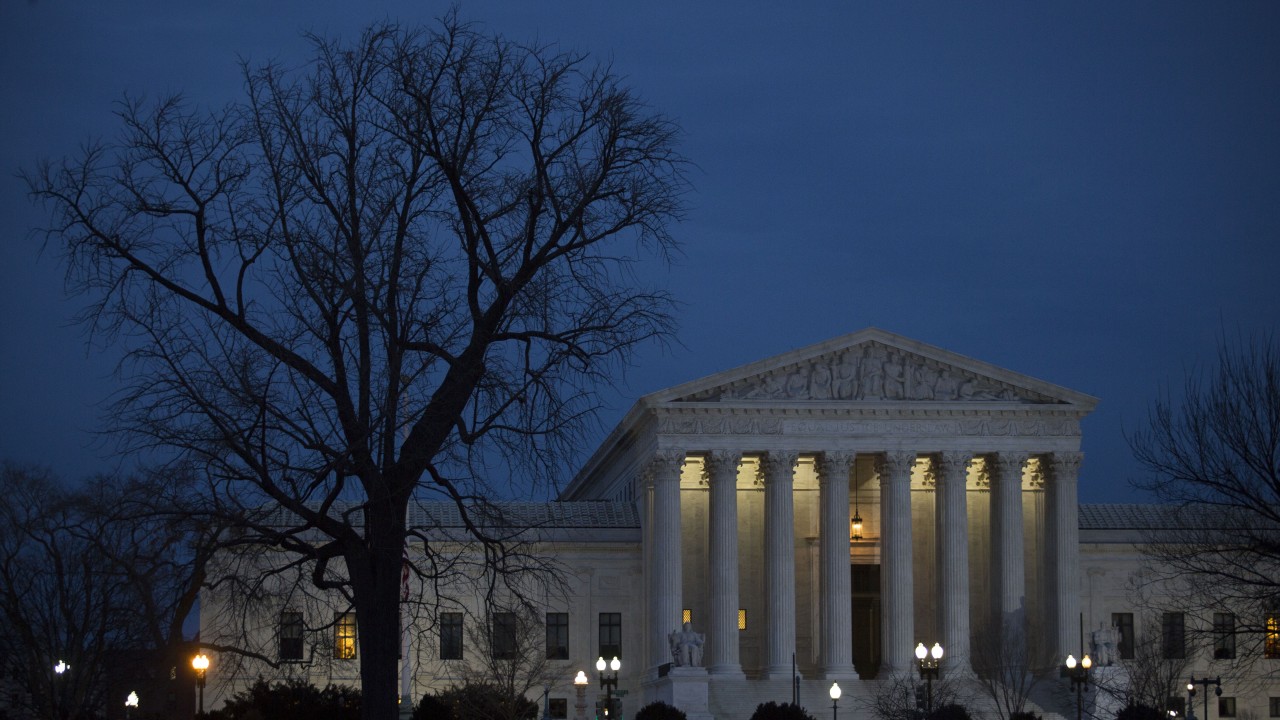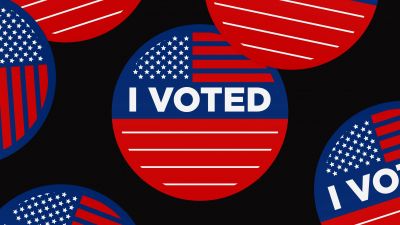
The US Supreme Court is seen in at dusk on February 14, 2016 in Washington, DC. (Photo by Drew Angerer/Getty Images)
The death of Scalia –> The Supreme Court’s conservative firebrand died unexpectedly Saturday of a heart attack, age 79. Senate Majority Leader Mitch McConnell and other leading Republicans, including the party’s presidential candidates, are demanding that his replacement not be named until after the election but, writes Joan Walsh at The Nation, “The president has 11 months left in his last term, which is, as he said, plenty of time to nominate and get confirmed a new justice. It will be tough getting anyone confirmed, given the fact that the right flank of the GOP Senate majority plays politics in a tougher way than the mainstream, but for McConnell to block a hearing and vote would take GOP obstruction to a new level.”
Scalia’s death will likely mean that with a court temporarily divided evenly by ideology, a number of cases currently before it may have a different outcome. For one, Michael Hiltzik writes at the Los Angeles Times, it throws a wrench in the plans of the anti-union group behind the recently argued Friedrichs vs. California Teachers Assn. case.
Depending on how long it takes to confirm a successor, Antonin Scalia’s death also may affect cases expected to come before the court in the years ahead; Obama’s Climate Plan might be more likely to survive, Robin Bravender and Jeremy P. Jacobs speculate at Greenwire: “Scalia was beloved by critics of environmental regulations and feared by proponents of expansive federal regulation. In his three decades on the high court, he penned a series of sharply worded opinions rolling back environmental rules.” His death could also mean the end of a GOP effort to redraw North Carolina’s district lines in a way that a lower federal court found to be racist, Anne Blythe reports for the Raleigh News & Observer.
And Ian Millhiser writes at ThinkProgress that no matter what you might think about his opinions, Scalia understood the power of an activist court, and warned against it: “Whatever we think of cases such as Rodriguez and Roe, liberals ignore Scalia’s warning at our peril. If we truly believe that the right to govern flows from the consent of the governed — if we believe in a nation led by representatives and not by kings — then there must be limits on the one unelected branch of government. And Scalia, to his credit, devoted much of his life to an effort to articulate such limits.”
Republican debate –> The Republican candidates for president came together for a knockdown dragout on Saturday evening in South Carolina. The audience turned on Donald Trump when he made comments disparaging George W. Bush’s handling of 9/11 and his decision to go to war against Iraq. At Vox, Matt Yglesias points out the irony that, after all of the many wild things Trump has said during his campaign, he drew the most establishment ire saying “that invading Iraq was a disaster, that the country was misled into invading Iraq by the Bush administration, and that the claim that Bush kept the country safe from terrorism is ridiculous because 9/11 happened on his watch.
“It was a bizarre and telling moment, in which the battered forces of the Republican establishment finally picked themselves up off the floor specifically in order to defend some of its least defensible conduct of the 21st century.”
AND: James Fallows writes at The Atlantic that contrary to the candidate’s claim, Trump was not such an ardent opponent of the invasion back in 2003. “As far as I can tell,” Fallows says, “Donald Trump’s ‘prescience’ and ‘foresight’ about the war is all based on a throwaway comment he made after the fighting had started and was running into trouble.”
Up for sale –> “The Democratic National Committee has rolled back restrictions introduced by presidential candidate Barack Obama in 2008 that banned donations from federal lobbyists and political action committees,” Tom Hamburger and Paul Kane report for The Washington Post.
Bernie Sanders has come out against the decision, which was announced hours after Thursday night’s Democratic debate, Andrew Perez and David Sirota report for IB Times: “The Vermont lawmaker’s campaign late Friday echoed criticism of the decision by campaign finance watchdog groups. Sanders campaign spokesman Michael Briggs said in a statement: ‘This an unfortunate step backward. We support the restrictions that President Obama put in place and we hope Secretary Clinton will join us in supporting the president…’ Clinton so far has been silent on whether Obama’s DNC fundraising policy should be abandoned or honored.”
How they did it –> The OpenSecrets blog from the Center for Responsive Politics has a longread detailing how Crossroads GPS — Karl Rove’s dark money nonprofit — convinced the IRS that it deserved tax-exempt status, even though it engaged in an amount of political messaging forbidden under that status. Robert Maguire writes: “Even in the later stages of its long-running discussions with GPS — interactions that included multiple meetings between teams of the group’s lawyers, led by Jeffery Yablon of Pillsbury Winthrop Shaw Pittman, and IRS staff — the agency didn’t examine some of the group’s most questionable activities.”
Today’s Morning Reads was compiled by John Light and edited by Michael Winship. See a story that you think should be included in Morning Reads? Tell us in the comments!
We produce a digest of money-and-politics news and the headlines every weekday. to receive these updates in your email inbox each morning.



